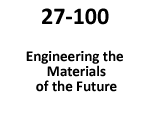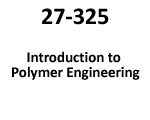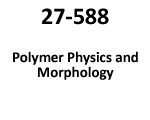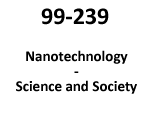Materials form the foundation for all engineering applications. Advances in materials and their processing are driving all technologies, including the broad areas of nano-, bio-, energy, and electronic (information) technology. Performance requirements for future applications require that engineers continue to design both new structures and new processing methods in order to engineer materials with improved properties. Applications such as optical communication, tissue and bone replacement, fuel cells, and information storage, to name just a few, exemplify areas where new materials are required to realize many of the envisioned future technologies. This course provides an introduction to how science and engineering can be exploited to design materials for many applications. The principles behind the design and exploitation of metals, ceramics, polymers, and composites are presented using examples from everyday life, as well as from existing, new, and future technologies. A series of laboratory experiments are used as a hands-on approach to illustrating modern practices used in the processing and characterization of materials and for understanding and improving materials' properties.
This course introduces the fundamental properties of solid polymer materials and the principles underlying the design as well as the engineering and manufacturing of polymer materials. The basic characteristics of macromolecules will be discussed followed by an introduction to technologically relevant engineering properties of polymer materials with focus on mechanical, electrical, and optical properties mechanical properties and relevant forming technologies as well as their significance to material performance. Case studies will introduce students to the various stages of technical product development, i.e. problem analysis, material selection and processing plan. The goal is to enable students to systematically approach and formulate materials selection processes and to utilize multiple information sources (patent and research literature data base) for the solution of problems in polymer technology.
This course introduces the fundamental concepts necessary to determine the structure and understand the properties of polymers in the solid state. The structure of polymers is discussed with focus on the amorphous, crystalline and liquid-crystalline state. Particular attention will be given to scattering techniques as a tool to determine polymer structures in solution and the solid state. The glass transition in amorphous polymers as well as the morphology and kinetics of crystal formation in semi-crystalline polymers will be discussed in detail. The second part of the course will focus on polymer multicomponent materials. Basic concepts of lattice models will be introduced and applied to predict the phase behavior of polymer blends. A paper project will facilitate to apply the course material to current research fields and to enable students in the effective use of electronic resources.
This course provides a holistic introduction to the emerging field of nanoscience and technology. It is designed for beginning students with broad disciplinary background and intends to stimulate further exploration as well as to sensitize students for the relevance of interdisciplinary thinking in emerging technological fields. The fundamental properties of materials with characteristic lengthscales in the nanometer range, the principles underlying the synthesis, characterization and engineering of nanomaterials as well as basic frameworks to understand the socio-economic impact of nanotechnologies are introduced. Case studies are used to convey some of the challenges relating to the toxicology, environmental effects and risk-management of nanomaterials. Available statistical data is used to illustrate major machanisms in the formation of public opinion on nanotechnology and to convey the relevance of balancing science vs. fiction. Guest lecutres will address some of the ethical dilemmas involving nanotechnologies.






